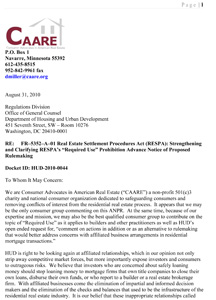INMAN News Story Dual Agency, No consensus on real estate dual agency, double-ending quoted from CAARE’s website yesterday:
“Nonprofit consumer advocacy group Consumer Advocates in American Real Estate (CAARE) calls dual agency involving one agent “legalized fraud” and “the ultimate ‘bait and switch.’ ” The group’s argument is that when a previously represented buyer becomes interested in a home listed by the same agent, that agent can suddenly cease to be an advocate for the buyer.
“Dual agency is potentially one of the worst ‘bait and switches’ possible because it involves the ‘switch’ (abandonment) of a trusted adviser and advocate. Even with disclosures, consumers rarely expect the change in relationship that comes with dual agency and they are almost never prepared for the complete abandonment that defines dual agency,” the group said on its website.“
CAARE has a lot of information on dual agency and is compiling more. Feel free to contact us if you are interested. Thanks Inman.






